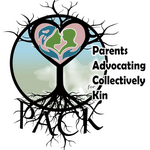
Joint submission to the Select Standing Committee on Health for its examination of the urgent and ongoing illicit drug toxicity and overdose crisis
About our submission
In July 2022, West Coast LEAF partnered with Parents Advocating Collectively for Kin (PACK) to make an oral presentation to BC’s Ministry of Health about how the family policing system undermines the health, safety, and wellbeing of parents who use substances, in particular mothers and birthing parents, and their children.
PACK is made up of mothers and birthing parents who use or have used drugs, as well as allies. PACK serves as a community voice by ensuring regional representation and community-based participation in BC’s response to the overdose crisis and in all matters impacting mothers and birthing parents who use or have used drugs. West Coast LEAF is grateful to be working closely with PACK as a partner in our Child Welfare Advocacy Communities of Practice Project. This project focuses on challenging the colonial family policing system and pushing for the supports families need to thrive together.
In our joint submission, PACK and West Coast LEAF outlined connections between the drug poisoning and overdose crisis and the family policing system:
- The family policing system often identifies caregiver substance use as a child protection concern. However, the fact that a person uses substances says nothing about their ability to parent. Family policing system intervention is often based on stigma about drug use instead of evidence. This stigma is compounded for parents who are Indigenous, Black, and/or poor, leading to a gross overrepresentation of their children in government care.
- Research shows that child apprehensions are associated with serious negative health outcomes for mothers and birthing parents, including increased overdoses. A study by Meaghan Thumath et al. (2021) found that women whose child or children had been removed had significantly higher odds of unintended overdoses than those who had not gone through a child apprehension. Colonialism makes this devastating linkage even stronger: Indigenous women who had experienced child removal had more than twice the odds of unintended overdose than non-Indigenous women who had never had a child taken away.
- Research also suggests that children and youth who are removed from their families and placed in government care tend to have poor health and wellbeing outcomes.
- The risk of family policing system involvement is a barrier to accessing health care, including harm reduction services, for many parents. Discriminatory assumptions about parents who use substances, combined with the perceived legal requirement to report child protection concerns to the authorities, put parents at risk when seeking services. The guidelines for the roll-out of a safe supply in BC do not include protections for parents who use drugs. This is also reflected in the Good Samaritan Act that does not cover protections for parents who use drugs.
- The Ministry for Children and Family Development (MCFD) lacks a dedicated budget and adequate policies, practices, and training to support families with caregivers who use substances, according to a 2014 report by the Representative for Children and Youth.
PACK and West Coast LEAF call for non-punitive policies and programs, including:
- Access to safe, nontoxic drugs and supplies accompanied by policies and practices that acknowledge the needs and realities of mothers and birthing parents
The BC government has committed to stepping up its response to the drug poisoning crisis, yet it has not addressed the role of the family policing system in endangering the health, wellbeing, and lives of drug users and their children.
- Gender-specific and culturally informed harm-reduction services
- Community-based, peer-led initiatives, with a strong emphasis on peer supports for parents and caregivers
- An end to MCFD’s abstinence-based approach to substance use and child welfare, with clearly defined harm reduction policies and practices
- Personalized, family-centered approaches instead of one blanket approach for all parents who use substances
- Action to challenge discrimination and stigma against parents who use substances in health care and social services
